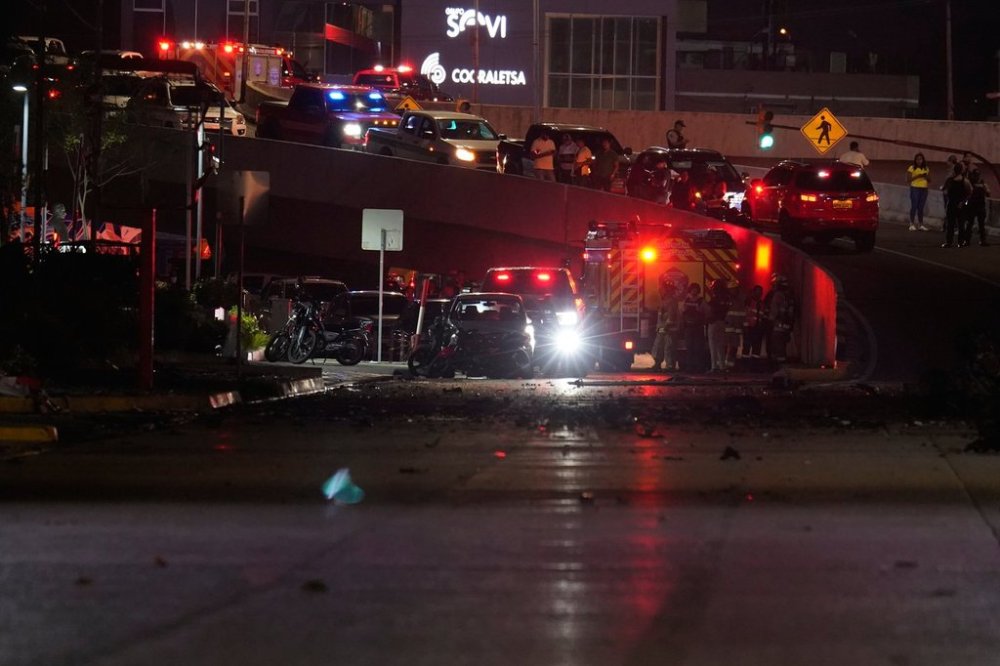Two explosions rock Ecuador. Authorities blame local criminal gang and Colombian ex-FARC dissidents
Advertisement
Read this article for free:
or
Already have an account? Log in here »
To continue reading, please subscribe:
Monthly Digital Subscription
$1 per week for 24 weeks*
- Enjoy unlimited reading on winnipegfreepress.com
- Read the E-Edition, our digital replica newspaper
- Access News Break, our award-winning app
- Play interactive puzzles
*Billed as $4.00 plus GST every four weeks. After 24 weeks, price increases to the regular rate of $19.00 plus GST every four weeks. Offer available to new and qualified returning subscribers only. Cancel any time.
Monthly Digital Subscription
$4.75/week*
- Enjoy unlimited reading on winnipegfreepress.com
- Read the E-Edition, our digital replica newspaper
- Access News Break, our award-winning app
- Play interactive puzzles
*Billed as $19 plus GST every four weeks. Cancel any time.
To continue reading, please subscribe:
Add Free Press access to your Brandon Sun subscription for only an additional
$1 for the first 4 weeks*
*Your next subscription payment will increase by $1.00 and you will be charged $16.99 plus GST for four weeks. After four weeks, your payment will increase to $23.99 plus GST every four weeks.
Read unlimited articles for free today:
or
Already have an account? Log in here »
QUITO, Ecuador (AP) — Two explosions rocked different parts of Ecuador on Wednesday, less than 24 hours after a vehicle exploded in a port city in the South American country and left one person dead.
Explosives were placed on bridges “to block traffic,” Transportation Minister Roberto Luque wrote on X, describing the acts as “terrorism.” No casualties have been reported, though roads leading to the affected areas remain closed.
Interior Minister John Reimberg accused “Los Lobos,” one of Ecuador’s largest criminal gangs, which is designated a foreign terrorist organization by the United States, and dissidents of the Revolutionary Armed Forces of Colombia, or FARC, a now-defunct Colombian guerrilla movement with ties to the gang, of being behind the blasts.

Reimberg said the attacks came after security operations destroyed “illegal mining operations” in northern Ecuador and detained ex-FARC members, known as the Oliver Sinisterra Front.
No group immediately claimed responsibility for the blasts.
The State Department’s Bureau of Western Hemisphere Affairs condemned the attacks in a post on the social media platform X on Wednesday, calling it a “brazen terrorist attacks against the Ecuadorian people.”
“We remain committed to the fight to eradicate organized crime and stand ready to support Ecuador in holding those responsible to account,” it wrote in a statement.
The Associated Press obtained a police report that confirmed the bridge structure in the city of Naranjal, about 290 kilometers (180 miles) southwest of the capital, Quito, sustained damage “from the suspected detonation”.
Marcela Aguiñaga, prefect of the Guayas province, where Naranjal is located, condemned the “criminal act” on X.
The other explosion occurred on a bridge connecting the provinces of Azuay and El Oro in southern Ecuador. The emergency services reported on X that the route was closed due to a “possible collapse” of the structure. Images released by local media showed rubble, twisted metal from the bridge, and shattered windshields on at least two buses.
On Tuesday night, a pickup truck exploded in a busy commercial area of the coastal city of Guayaquil, killing a man and wounding two other people, while damaging restaurants, buildings, and a popular shopping mall.
The Attorney General’s Office said it had launched an investigation into the blasts, while the government offered a reward for any information leading to the identification and capture of those responsible.
The explosions are the latest in a wave of violence that has engulfed the South American nation in recent years as criminal enterprises have shifted their drug smuggling from more militarized countries like Colombia to historically peaceful Ecuador. The government of President Daniel Noboa has struggled to beat back criminal groups.
On Wednesday, Noboa said in a public event that the country cannot “back down before people who want to terrorize Ecuadorian families.
In March, a vehicle exploded outside Ecuador’s largest and most dangerous prison on the outskirts of Guayaquil, killing a prison guard.
In 2023, Ecuador saw several other car bomb attacks as part of a wave of criminal violence that has plagued the Andean nation since early 2021.
____
Follow AP’s coverage of Latin America and the Caribbean at https://apnews.com/hub/latin-america

